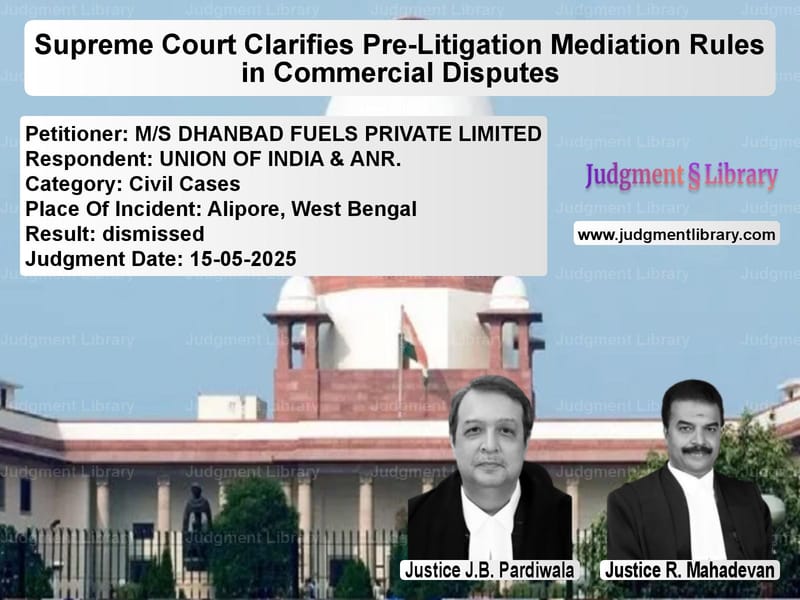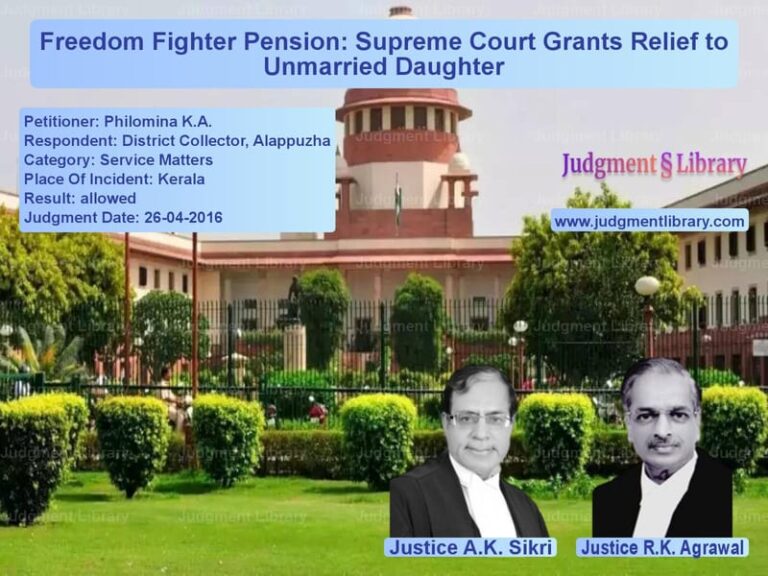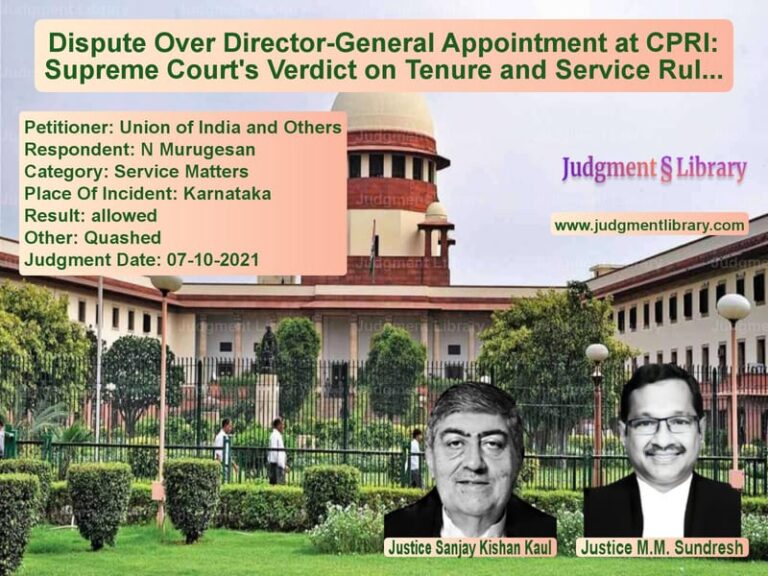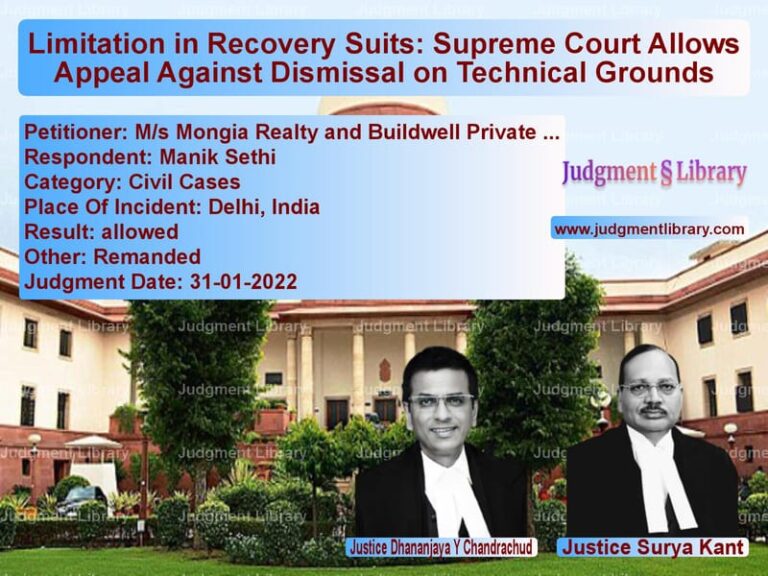Supreme Court Clarifies Pre-Litigation Mediation Rules in Commercial Disputes
In a significant ruling that provides much-needed clarity on the mandatory nature of pre-litigation mediation in commercial disputes, the Supreme Court has dismissed an appeal challenging the maintainability of a money suit filed without first exploring mediation. The case of M/S Dhanbad Fuels Private Limited versus Union of India & Anr. centered around the interpretation of Section 12A of the Commercial Courts Act, 2015, which mandates pre-institution mediation for commercial suits that don’t contemplate urgent interim relief.
The dispute began when the Union of India instituted Money Suit No. 28 of 2019 on August 9, 2019, in the Commercial Court, Alipore, against Dhanbad Fuels Private Limited for recovery of Rs. 8,73,36,976 towards differential freight and penalty. Notably, no urgent interim relief was prayed for in the suit. The appellant company raised a preliminary objection in its written statement dated December 20, 2019, challenging the maintainability of the suit without availing the remedy of pre-institution mediation under Section 12A of the Commercial Courts Act, 2015, read with Pre-Institution Mediation and Settlement Rules, 2018.
Subsequently, on September 30, 2020, the appellant filed an application under Order VII Rule 11(d) of the Civil Procedure Code seeking rejection of the plaint on the ground that the money suit suffered from institutional defects and violated the mandatory provisions of pre-institution mediation. The Commercial Court rejected this application on December 21, 2020, observing that since the case had been filed on August 9, 2019, and the application was filed at a belated stage, there was no requirement to reject the suit even for non-compliance of the mandatory provision of Section 12A.
The Commercial Court, while declining to reject the plaint, directed post-institution mediation by asking the parties to appoint an advocate as mediator. Dissatisfied with this order, the appellant challenged it before the Calcutta High Court, which disposed of the revision application by directing that the suit be kept in abeyance for seven months or until receipt of the mediator’s report, whichever was earlier.
Arguments Presented by the Appellant
Mr. Vikas Singh, the learned Senior Counsel appearing for the appellant, vehemently submitted that the High Court committed an egregious error in declining to reject the plaint having regard to the mandatory provision of Section 12A of the 2015 Act. He argued that the issue is squarely covered by the decision of this Court in Patil Automation Private Limited and Others v. Rakheja Engineers Private Limited where the Court declared Section 12A to be mandatory and held that any suit instituted violating its mandate must be visited with rejection of the plaint under Order VII Rule 11.
The appellant’s counsel laid much emphasis on the observations made by this Court in Patil Automation as contained in paragraphs 103 and 114 of the judgment. He argued that “since there has been no progress worth the name in the suit in question, the mandate of Section 12A will apply with all force and the plaint ought to meet with the fate of rejection.”
The counsel further submitted that this Court in Patil Automation applied the principle of prospective overruling and that “if the suit is allowed to proceed further the same would amount to a fresh litigation as it has not progressed beyond the initial stage and has been under subsisting orders of stay since 2021.” He contended that there remained no material distinction between a fresh suit if filed today and the present suit sought to be revived from the state of inception.
Regarding the limitation period, the counsel submitted that “if the suit is withdrawn today and filed afresh after exploring the avenue of pre-institution mediation, it would not, in any manner, give rise to the question of limitation having been exhausted, since the plaintiff is the Central Government, and the limitation to file the suit by Central Government is 30 years under Article 112 of the schedule of the Limitation Act, 1963.”
Arguments Presented by the Union of India
Ms. Archana Pathak Dave, the learned Additional Solicitor General, submitted that no error could be said to have been committed by the High Court in passing the impugned order. She laid much emphasis on the fact that “the suit instituted by the Union of India for recovery of money from the appellant herein should not fail in view of the purported non-compliance with Section 12A of the 2015 Act, more particularly, when the infrastructural requirement for the mediation process was not completed and the Standard Operating Procedure came to be framed only on 11.02.2020.”
The ASG provided a detailed timeline table showing that after the establishment of the first Commercial Court in Alipore, the statutory framework and corresponding rules were progressively implemented till December 2020. She argued that “the money suit instituted in 2019 could not have been referred to pre-suit mediation under Section 12A due to persisting infrastructural vacuum created by lack of appointment of necessary authorities/mediators and delineation of the procedural framework for the same.”
The ASG fortified her submission by relying on the equitable maxim lex non cogit ad impossibilia, i.e., law does not compel an impossible performance. She submitted that “taking advantage of this administrative vacuum, the appellant should not be allowed to defeat the money suit under the garb of non-compliance. Section 12A, at its nascent stage was not a feasible course.”
She further argued that “had Union of India awaited the establishment of the requisite infrastructure, the same would have unduly impeded the recovery process in a money suit involving public funds, thereby defeating the very purpose and legislative intent of the 2015 Act, which aims to ensure expeditious resolution of commercial disputes.”
The Supreme Court’s Analysis and Reasoning
The Supreme Court, comprising Justices J.B. Pardiwala and R. Mahadevan, began its analysis by examining the legislative intent behind Section 12A of the Commercial Courts Act. The Court noted that “the aim and object of Section 12A is to ensure that before a commercial dispute is filed before the court, the alternative means of dissolution are adopted so that only genuine cases come before the courts. The said procedure has been introduced to decongest the regular courts.”
The Court extensively referenced its earlier decision in Patil Automation, where it had declared Section 12A to be mandatory. Quoting from that judgment, the Court noted: “We declare that Section 12-A of the Act is mandatory and hold that any suit instituted violating the mandate of Section 12-A must be visited with rejection of the plaint under Order 7 Rule 11. This power can be exercised even suo motu by the court as explained earlier in the judgment. We, however, make this declaration effective from 20-8-2022 so that stakeholders concerned become sufficiently informed.”
The Court emphasized the prospective application of the Patil Automation decision, noting that “in Patil Automation (supra), this Court held that the language of Section 12A is plainly imperative in nature, and any commercial suit instituted without adhering to this provision is liable to be rejected under Order VII Rule 11 of the CPC. However, recognising that the Amending Act containing Section 12A is a ‘toddler’, and that the ‘law necessarily would have teething problems at the nascent stage’, this Court declared the aforesaid declaration to operate prospectively, effective from 20.08.2022.”
Addressing the equitable maxim lex non cogit ad impossibilia, the Court observed: “It is settled that law does not compel an impossible performance… The materials on record would indicate that after the establishment of the first Commercial Court at Alipore, the statutory framework and corresponding rules were progressively implemented until December 2020. Therefore, during this intervening period, referring the matter to pre-suit mediation under Section 12A was impossible due to a persisting vacuum created by lack of appointment of necessary authorities and delineation of the procedural framework.”
The Court harmoniously construed the observations in Patil Automation, noting that “while Section 12A is held to be mandatory from the date of the inception of the provision itself, the consequence of rejection for non-compliance is only made applicable prospectively.” The Court further explained: “Thus, although suits which were instituted before the date of the decision in Patil Automation (supra) may not be rejected under Order VII Rule 11 for not complying with Section 12A of the 2015 Act… yet this would not obviate the requirement of giving the parties a chance to attempt to resolve the disputes through mediation as envisaged under Section 12A of the 2015 Act.”
The Court rejected the appellant’s contention that the plaint should be rejected because the suit was still at a nascent stage, observing: “We do not see how directing the respondents to institute a fresh suit would be of any benefit to the appellant… Directing the institution of a fresh suit would only result into the forfeiture of the court fees deposited by the respondents, which would only be an unnecessary burden on the public exchequer.”
Conclusion and Final Ruling
In its concluding remarks, the Supreme Court summarized its findings, establishing clear guidelines for the application of Section 12A:
“The decision of this Court in Patil Automation (supra) lays down the correct position of law as regards Section 12A of the 2015 Act by holding it to be mandatory in nature.” However, “any suit which is instituted under the 2015 Act without complying with Section 12A is liable to be rejected under Order VII Rule 11. But this declaration applies prospectively to suits instituted on or after 20.08.2022.”
The Court provided crucial clarification on suits instituted before this cutoff date: “Suits instituted without complying with Section 12A of the 2015 Act prior to 20.08.2022 cannot be rejected under Order VII Rule 11 on the ground of non-compliance with Section 12A unless they fall within the exceptions stipulated in paragraph 113.2 and 113.3 of the decision in Patil Automation (supra).”
For such pending suits, the Court directed: “In suits instituted without complying with Section 12A of the 2015 Act prior to 20.08.2022 which are pending adjudication before the trial court, the court shall keep the suit in abeyance and refer the parties to time-bound mediation in accordance with Section 12A of the 2015 Act if an objection is raised by the defendant by filing an application under Order VII Rule 11, or in cases where any of the parties expresses an intent to resolve the dispute by mediation.”
The Court ultimately dismissed the appeal, holding that “the approach adopted by the High Court in the impugned order in keeping the suit in abeyance and referring the parties to mediation, strikes a perfect balance between the mandatory nature of Section 12A of the 2015 Act as well as the prospective applicability of the consequence of non-compliance with Section 12A as held in Patil Automation (supra).”
This judgment provides much-needed clarity on the implementation of pre-litigation mediation in commercial disputes, balancing the mandatory nature of Section 12A with practical considerations about its implementation timeline. It ensures that while the mediation requirement is strictly enforced for future cases, past cases aren’t unfairly penalized for non-compliance during the initial implementation phase when the necessary infrastructure was still being established.
Petitioner Name: M/S DHANBAD FUELS PRIVATE LIMITED.Respondent Name: UNION OF INDIA & ANR..Judgment By: Justice J.B. Pardiwala, Justice R. Mahadevan.Place Of Incident: Alipore, West Bengal.Judgment Date: 15-05-2025.Result: dismissed.
Don’t miss out on the full details! Download the complete judgment in PDF format below and gain valuable insights instantly!
Download Judgment: ms-dhanbad-fuels-pr-vs-union-of-india-&-anr-supreme-court-of-india-judgment-dated-15-05-2025.pdf
Directly Download Judgment: Directly download this Judgment
See all petitions in Contract Disputes
See all petitions in Debt Recovery
See all petitions in Commercial Arbitration
See all petitions in Mediation Cases
See all petitions in Dispute Resolution Mechanisms
See all petitions in Judgment by J.B. Pardiwala
See all petitions in Judgment by R. Mahadevan
See all petitions in dismissed
See all petitions in supreme court of India judgments May 2025
See all petitions in 2025 judgments
See all posts in Civil Cases Category
See all allowed petitions in Civil Cases Category
See all Dismissed petitions in Civil Cases Category
See all partially allowed petitions in Civil Cases Category







